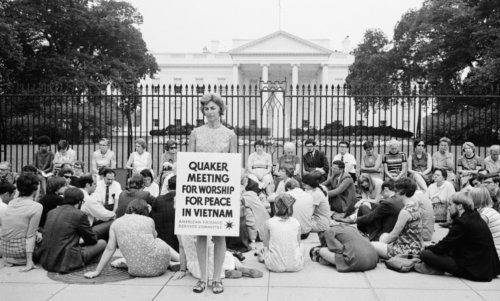
This past weekend, I was up in New York City visiting an old friend and mentor, David McReynolds. Back in 2000, I did my teenage best to support him in his campaign for president. I’ve always seen David as an example of courageous thought and action, coupled with a gentleness that is often lost among activists.
On Saturday, I met David at his apartment in lower Manhattan. We drank seltzer water and he introduced me to his cat, Shaman. Then, we went out for a late lunch at a neighborhood restaurant. A nice afternoon.
Shortly before I left to catch my train, our conversation touched briefly on Quakers. David said something that I’ve been chewing on for the last few days. If he were going to convert, David said, he would more likely become a Roman Catholic than a Quaker. His reason for this? Your average Catholic tends to have a deep sense of human sinfulness and each person’s need for Jesus and the Church. There’s a built-in humility there. We Quakers tend to be pretty satisfied with ourselves.
There might have been a time in my life when this observation would have rubbed me the wrong way. But coming from David, who identifies as an Atheist, it resonated.
David is quick to add that not all Catholics are burdened by guilt, and he’s known Quakers who lived saintly lives. Still, I think he’s onto something here. I’ve recently been re-engaging with the liturgical and monastic Christian traditions. I’ve been impressed with the degree to which a sense of personal unworthiness and repentance is at the heart of monastic practice.
At the same time, I’ve felt convicted about how much confidence I have had in my own ability to know and follow God. In retrospect, I have often been confused, frightened, self-centered, and adrift. These days, I’m more skeptical about my own ability to know the will of God with a great deal of certainty. This puts me at odds with much of the Quaker community. Modern-day Quakers tend to view following God as a fairly straightforward process, and human nature as basically good.
To be clear, I am not saying that the root of Quaker tradition views human beings this way. Early Quakers were skeptical of humanity’s ability to do the right thing. Rather than viewing people as naturally good, they relied on the direct intervention of the Holy Spirit to correct and guide us. The bulk of Quakers throughout history viewed humanity as basically lost – if not depraved.
But there’s a gap between what the tradition has been and what the community now believes, in practice, today. In my experience, most of us Quakers – myself included – have a tendency to be pretty proud of ourselves. We’re proud that we have affirmed women in ministry for three and a half centuries. We’re proud that we renounced slavery a century earlier than the United States did. We’re proud of the work that our ancestors did in the civil rights and the peace movements. We think we’re pretty special. The world could learn a thing or two from us.
The issue is clouded because, as a matter of fact, Quakers have had an outsized impact on American history and culture. The Quaker community has been unique and important. But in the 20th and 21st centuries, this history of spiritual leadership has congealed into something far less attractive. We’ve developed a certain spiritual pride – a sense that we know better than those around us. We’ve come to believe that we’re good people.
The problem with this is, we’re not. I’m certainly not. The Quaker tradition is beautiful in many ways, silly in others. But in no way has it produced a community of perfect people. Quakers today are no better – or worse – than our Protestant, Catholic, Buddhist, or Atheist neighbors. We may still be a peculiar people, but we are not a special people. Our human nature is as fallen and in need of God’s grace as anyone else’s.
To repeat for clarity: A sense of our own sinful unworthiness is native to the Quaker tradition. But we seem to have lost it. We’ve traded it in for a self-congratulatory sense of Quaker-led historical progress.
I’m grateful for the faithfulness of past generations of Quakers. But I’m also convinced that it’s spiritually damaging for me to continue claiming their work as my own. I’m not a special person. I’ve not risen above my need for a savior. I am a poor sinner, at least as much in need of God’s grace as anyone else.
There are dangers here. It’s possible to embrace sin, seeing it as reality rather than a barrier that God can overcome. Many Christian groups have fallen into this trap. But the delusion that I and many other Quakers have fallen into is also problematic. The idea that sin is already defeated, or doesn’t even exist. The myth of “nice people like us.” At this point in my life, it seems safer to err on the side of over-questioning my own experience and motivations. Assuming the goodness of my thoughts and actions is dangerous.
My conversation with David was a reminder. The skeptical world is unimpressed with people who think they’re wonderful. People can see right through the false piety of Quaker self-satisfaction. But the humility of the God-yielded sinner is magnetic, even for those who are not yet ready to believe.
This dying world doesn’t need perfect people. It needs broken people who are able to confess their own thirst for living water. And invite others to join them in seeking it.